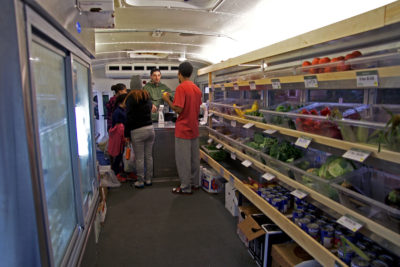
Local nonprofit Fresh Truck is looking to further revolutionize the food truck concept through providing healthy and affordable foods to underserved communities, said co-founder Annika Morgan.
The mobile community market, Fresh Truck, has recently upgraded their bus for the first time since forming four years ago, with the purpose of not only engaging more consumers, but better providing for the specific dietary needs of low-income Boston neighborhoods, Morgan said.
While Morgan’s co-founder Josh Trautwein was working as a health educator at a center in Charlestown, he said he realized that despite the amount of engagement being done for the local families, there was no viable grocery store for them to shop at, Morgan said.
“We started out with a mobile market that carried fresh fruits and vegetables, all raw and uncut, as sort of a mobile produce option for neighborhoods across Boston,” Morgan said.
Through working with Kipp Bradford, a research scientist at the Massachusetts Institute of Technology’s Media Lab, as well as collaborating with sweetgreen, Morgan said Fresh Truck was able to implement both technical and design updates.
These changes include a new refrigeration system, in an effort to carry a wider range of perishable items, in addition to a more appealing truck wrap that better advertises the nonprofit’s goal, Morgan said.
Morgan said these renovations will aid in Fresh Truck’s mission to further address the multifaceted topic of food accessibility head-on, which they already work to do through weekly markets, pop-up events and their food prescription program, FreshRX.
“Our weekly market really is to be that reliable resource in a neighborhood,” Morgan said. “Providing geographic proximity to healthy food, a culturally relevant shopping experience and inventory of items, and then at an affordable price.”
Bradford said Fresh Truck presented the opportunity to create a different food experience, where produce could essentially move directly from the farm to a consumer’s table.
“There’s a lot of hidden energy that gets used or wasted … during all of these intermediary steps,” Bradford said. “To me, what was interesting about Fresh Truck, was the idea of a mobile, community refrigerator.”
Kristina St. Cyr, coalition and advocacy manager for the Massachusetts Public Health Association, said programs such as Fresh Truck are beneficial to those affected by the food desert phenomenon in the state.
“The data from those maps [that MHPA put out] reveal that there are 2.8 million Massachusetts residents, and that includes over 700,000 children and 523,000 seniors, living in low-income neighborhoods with low grocery store access,” St. Cyr said.
St. Cyr said food deserts are areas that lack access to different healthy food options, and typically impact communities of color and low-income neighborhoods the most, such as Dorchester and Mattapan.
Several Boston residents said they are impressed with Fresh Truck’s initiative to provide a greater variety of healthy foods, but surprised so many communities lacked access to these options.
Dawn Lavallee, 28, of Dorchester, said she used to work at a school in Dorchester that would receive deliveries from Fresh Truck, and voiced appreciation for the nonprofit’s work.
“It’s more economically viable for businesses to be in those neighborhoods as well,” Lavallee said. “I don’t think it necessarily has to be people giving away food. So there are things the City could do to make it a better business proposition for a grocery store to be there.”
Gabriel Bender, 30, of Kenmore, said the state should use Fresh Truck as a model, so Boston’s communities are served to an even greater extent.
“I’m sure there are food banks that provide this sort of service,” Bender said. “It’s a fantastic program, and I think that if Boston isn’t currently working on something like that, then tax dollars definitely should be used in some sort of effort as such.”
Bo Redpath, 26, of Beacon Hill, said Fresh Truck’s work to expand fresh produce is an admirable feat.
“That’s definitely misfortunate [that many citizens lack access to food options],” Redpath said. “I mean healthy foods, everyone should have. There’s just got to be a way to either get the prices down or have something that’s more long-term where they can consistently get those goods because it’s not going to make a difference if they get one meal out of a million.”


















































































































